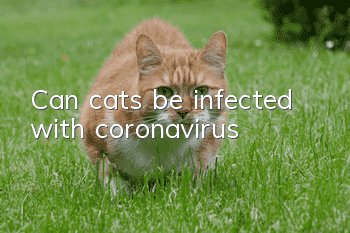Can cats be infected with coronavirus?

Humans, rats, pigs, cats, dogs, and poultry vertebrates can all be infected. So as a cat owner who is usually "cold and beautiful", she can also be infected with feline coronavirus. Did you know?
So what exactly is feline coronavirus? Is its fatality rate high? Can cat owners be cured once they contract the disease?
Feline enteric coronavirus disease is an intestinally transmitted disease in cats caused by enteric coronavirus, which mainly causes enteritis in young kittens.
This virus belongs to the family Coronaviridae and the genus Coronavirus.
This disease often occurs in kittens during the weaning period, which will cause the kitten's body temperature to rise and its appetite to decrease. Vomiting occurs, intestinal peristalsis accelerates, etc. In severe cases, diarrhea and anal swelling may occur. Symptoms such as dehydration.
But don’t worry too much, the death rate from coronavirus is generally relatively low.
It is worth noting that sick cats and cats carrying the virus will excrete a large amount of the virus through their feces. Although cats who recover from the disease can still carry the virus in their bodies, it will not cause disease.
Therefore, if your cat develops enteritis, you should suspect this disease as soon as possible.
If you are sick, generally no treatment is needed. If dehydration is severe, rehydration is required.
Because the virus may be widely distributed among cats, many cats without clinical symptoms may also be carriers. Therefore prevention is difficult.
Normally, hygiene management at home should be strengthened to improve the cat’s resistance.
Another thing to note is that cat coronavirus and abdominally transmitted coronavirus are different, and the two are easily confused.
Cat-borne infection is essentially a coronavirus, but infection with coronavirus does not necessarily mean infection with the virus.
Coronavirus is a relatively common virus, and cats are easily infected. If the coronavirus stays in the cat’s intestines and does not cause trouble, then the cat will still be healthy and there will be no major problems. At most, I have diarrhea and vomiting occasionally.
Only when the coronavirus suddenly starts to have a mind of its own, mutates, and then leaves the intestines, invades other organs, and inflames them, will it develop into feline transmission.
Don’t get embarrassed talking about coronavirus. There is nothing to be afraid of whether it is feline coronavirus or novel coronavirus.
When symptoms occur, you must go to the hospital for examination in time for early detection, diagnosis and treatment. Strengthening your own resistance is stronger than anything else.
- How to care for a cat with a sensitive stomach?
- Scooping skills: Cats’ mental health is also important
- How vengeful is a cat?
- How often should cats take oxytocin injections? Usage and dosage of oxytocin for cats!
- Do cats succumb to violence?
- How long after the injection can a cat take a bath?
- What does "week cat" mean? It means a cat that can't last more than one week.
- What are the symptoms of cat dander allergy and how to improve allergy symptoms?
- How many colors are there in Malinois?
- Cat breed characteristics, appearance and personality let you know



